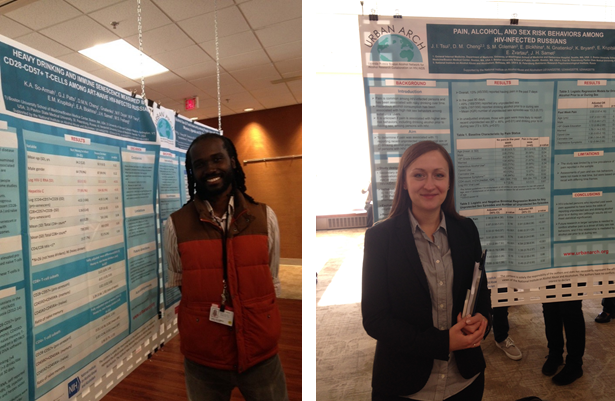Core and Cohort Updates
Admin Core
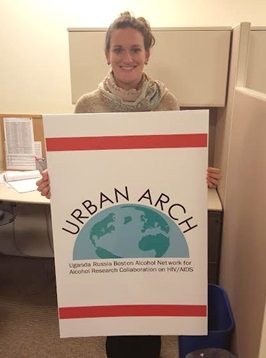 The Admin Core has been busy preparing for its grant renewal in addition to assisting the U01s and BDM Core with their submissions to NIAAA. During Dr. Bryant’s visit to Boston, the Admin Core arranged some time for him and our junior investigators, Drs. Sabrina Assoumou, Angela Walter, and Zoe Weinstein, to discuss their research interests and NIAAA funding opportunities. We also assisted with the facilitation of two K award grant submissions for Drs. Lunze and So-Armah, worked with Boston ARCH, Uganda ARCH, and the BDM Core on shipping serum samples for testing, and continued coordinating the cross-cohort ARCH women’s analyses discussions for all the U01s. In addition, we assisted with the planning of our second DSMB meeting of the year in late October, which had a primary focus on the ZINC trial.
The Admin Core has been busy preparing for its grant renewal in addition to assisting the U01s and BDM Core with their submissions to NIAAA. During Dr. Bryant’s visit to Boston, the Admin Core arranged some time for him and our junior investigators, Drs. Sabrina Assoumou, Angela Walter, and Zoe Weinstein, to discuss their research interests and NIAAA funding opportunities. We also assisted with the facilitation of two K award grant submissions for Drs. Lunze and So-Armah, worked with Boston ARCH, Uganda ARCH, and the BDM Core on shipping serum samples for testing, and continued coordinating the cross-cohort ARCH women’s analyses discussions for all the U01s. In addition, we assisted with the planning of our second DSMB meeting of the year in late October, which had a primary focus on the ZINC trial.
New Admin Core Research Assistant, Terri O’Brien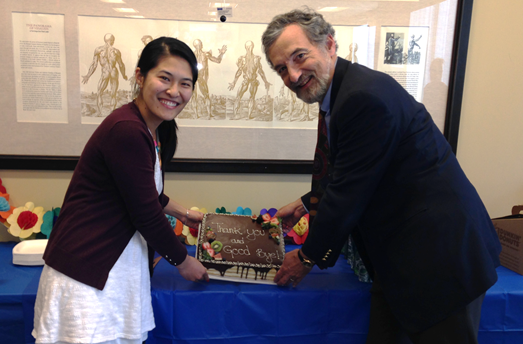
Finally, the Admin Core congratulates Lucero Leon-Chi for her new position as an Epidemiologist at the Massachusetts Department of Public Health’s HIV/AIDS Surveillance Program. Good luck, Lucero, on your future endeavors! We are also pleased to welcome a new research assistant – Terri O’Brien. Terri will assist in coordinating activities of the URBAN ARCH Admin Core while she completes her MPH at the Boston University School of Public Health. Welcome to the team, Terri!
l-r: Lucero Leon-Chi and Jeffrey Samet at her goodbye party
BDM Core
The BDM Core has been active in collaborating with each cohort and the Admin Core on the ARCH renewal applications. In addition, the core is completing work on cross-cohort projects and several manuscripts are in progress. The BDM continues to assist with the sample repository and several data management activities.
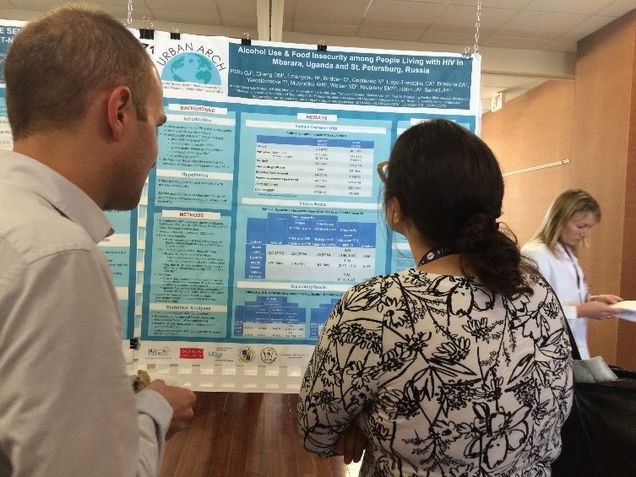 Greg Patts (left) presenting his “Alcohol use & food insecurity among people living with HIV in Mbarara, Uganda and St. Petersburg, Russia” poster at the Boston University Evans Research Day Poster Session in October 2015
Greg Patts (left) presenting his “Alcohol use & food insecurity among people living with HIV in Mbarara, Uganda and St. Petersburg, Russia” poster at the Boston University Evans Research Day Poster Session in October 2015
Uganda Cohort
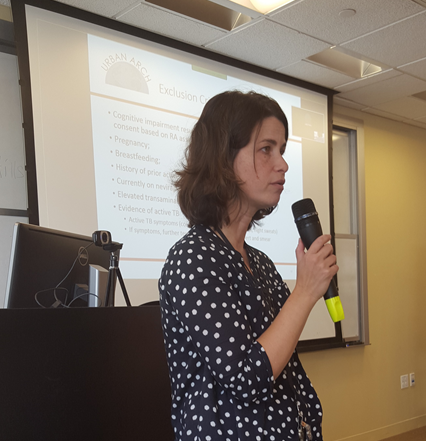 As of November 1st 2015, Uganda ARCH has concluded enrollment with a total of 484 subjects. Uganda ARCH has conducted 327 6-month assessments, 242 12-month assessments, 126 18-month assessments, 93 24-month assessments, 28 30-month assessments, and 24 36-month assessments. There are currently 20 active participants, and we plan to conclude follow up by the end of November 2015. Follow up rates continue to be exceptionally high, and the study is running smoothly.
As of November 1st 2015, Uganda ARCH has concluded enrollment with a total of 484 subjects. Uganda ARCH has conducted 327 6-month assessments, 242 12-month assessments, 126 18-month assessments, 93 24-month assessments, 28 30-month assessments, and 24 36-month assessments. There are currently 20 active participants, and we plan to conclude follow up by the end of November 2015. Follow up rates continue to be exceptionally high, and the study is running smoothly.
Karen Jacobson presenting “TB preventive therapy among HIV-infected alcohol drinkers in Uganda” at the BMC Urban Health Research in Progress in November 2015.
We tested our last batch of plasma samples with low and undetectable viral load values at baseline. Out of 41 plasma samples of participants with viral loads >500 copies/ml tested for HIV AB, 11 were confirmed HIV negative and have been excluded from analyses. For the remaining 30, who tested positive, we are in the process of confirming presence of ART.
Dr. Julian Adong has been in San Francisco since September 2015 taking two classes in Epidemiology and Biostatistics at UCSF. She is also working on completing her manuscript using data from the URBAN ARCH Uganda cohort. Dr. Adong is working on the topic: “Does spirituality predict changes in alcohol use and is this effect mediated by depressive symptoms?”
Russia Cohort and ZINC RCT
As of November 1, 2015, Russia ARCH (n=351) conducted 257 six-month assessments, 185 twelve-month assessments, 118 eighteen-month assessments, and 61 twenty four-month assessments. As of November 1, 2015, ZINC (n=254) conducted 157 six-month assessments, 90 twelve-month assessments, and 39 eighteen-month assessments.
The team is actively pursuing data analyses, abstract submissions, and manuscript preparation. In October, five posters presenting Russia ARCH/ZINC data were displayed at the annual BU School of Medicine Evans Department of Medicine Research Day poster session.
The team is in the midst of preparing their proposal for the URBAN ARCH grant renewal to be submitted in January.
l-r: Kaku So-Armah presenting his “Heavy drinking and immune senescence measured by CD28-CD57+ T-cells among ART-naïve HIV-infected Russians” and Natalia Gnatienko presenting Judy Tsui’s “Pain, alcohol, and sex risk behaviors among HIV-infected Russians” posters at the Boston University Evans Research Day Poster Session in October 2015
Boston Cohort
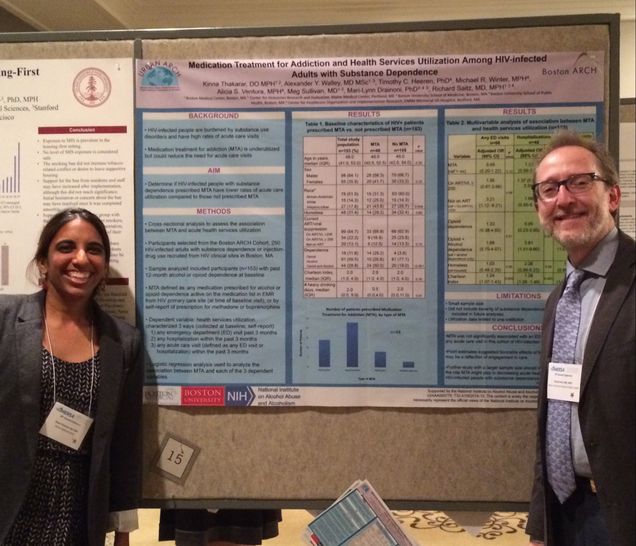 As of November 1, 2015, Boston ARCH has enrolled the target number of participants into the cohort (n=250). The Boston ARCH team has completed 245 6-month follow-up assessments, 226 12-month follow-up assessments, 163 18-month follow-up assessments, 119 24-four month follow-up assessments, and 24 30-month follow-up assessments. The team also completed 246 supplement assessments to assess lifetime alcohol and drug use and consequences in the cohort.
As of November 1, 2015, Boston ARCH has enrolled the target number of participants into the cohort (n=250). The Boston ARCH team has completed 245 6-month follow-up assessments, 226 12-month follow-up assessments, 163 18-month follow-up assessments, 119 24-four month follow-up assessments, and 24 30-month follow-up assessments. The team also completed 246 supplement assessments to assess lifetime alcohol and drug use and consequences in the cohort.
l-r: Kinna Thakarar and Rich Saitz at AMERSA
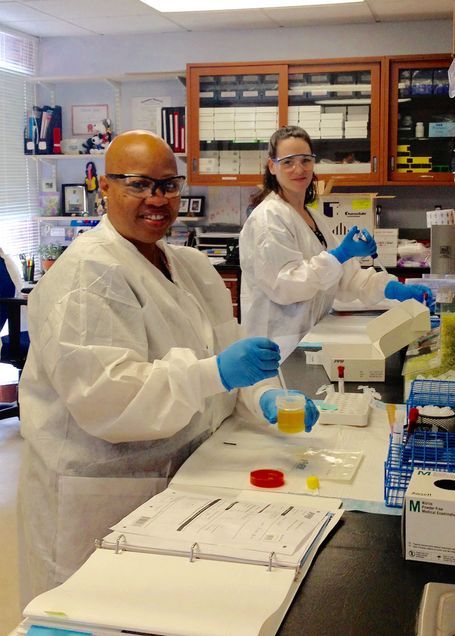 The Boston ARCH team and the BDM Core continue to work with a number of junior faculty, fellows and graduate students to support new analyses of Boston ARCH data, abstract submissions and manuscript preparation. Dr. Kinna Thakarar presented her abstract “Medication Treatment for Addiction and Health Service Utilization among HIV-infected Adults with Substance Dependence” as a poster at the 39th Annual AMERSA Conference in Washington, D.C., November 5-7, 2015. In August 2015, Boston ARCH Co-Investigator Dr. Michael Holick conducted the first batch of testing for bone turnover markers using Boston ARCH serum stored in the URBAN ARCH Repository at his laboratory on the Boston University Medical Center. Dr. Holick’s laboratory performed the following assays: Collagen Type I C-Telopeptide (a marker of bone resorption), Procollagen type I.N-terminal propeptide (a marker of bone formation) and intact parathyroid hormone. The Boston ARCH study team has been working with the URBAN ARCH Repository staff to prepare additional serum specimens that will be sent to Q2 Solutions in Valencia, California and tested for free and total testosterone, albumin, magnesium, calcium and phosphorus.
The Boston ARCH team and the BDM Core continue to work with a number of junior faculty, fellows and graduate students to support new analyses of Boston ARCH data, abstract submissions and manuscript preparation. Dr. Kinna Thakarar presented her abstract “Medication Treatment for Addiction and Health Service Utilization among HIV-infected Adults with Substance Dependence” as a poster at the 39th Annual AMERSA Conference in Washington, D.C., November 5-7, 2015. In August 2015, Boston ARCH Co-Investigator Dr. Michael Holick conducted the first batch of testing for bone turnover markers using Boston ARCH serum stored in the URBAN ARCH Repository at his laboratory on the Boston University Medical Center. Dr. Holick’s laboratory performed the following assays: Collagen Type I C-Telopeptide (a marker of bone resorption), Procollagen type I.N-terminal propeptide (a marker of bone formation) and intact parathyroid hormone. The Boston ARCH study team has been working with the URBAN ARCH Repository staff to prepare additional serum specimens that will be sent to Q2 Solutions in Valencia, California and tested for free and total testosterone, albumin, magnesium, calcium and phosphorus.
l-r: Della Carter (GCRU Laboratory Manager) and Jennifer Pickering (GCRU Laboratory Assistant) hard at work in the GCRU Laboratory. Della and Jen are responsible for processing, tracking, and storing all Boston ARCH blood specimens.
